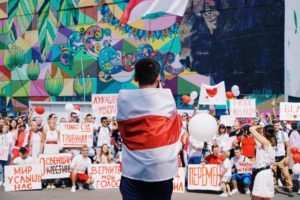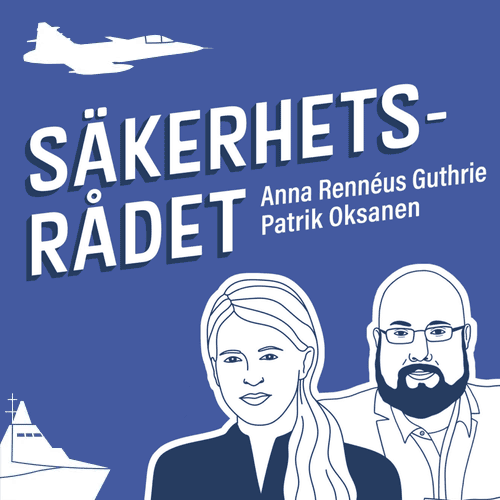This article is part of the Let The World Hear Project, which is a collaboration between Stockholm Free World Forum’s webzine Säkerhetsrådet and a number of Belarusian volunteers. Together we have gathered stories from victims of the dictatorship regime in 2020. The world must know what happened.
Read more about the project here.
This is the story of 32-year-old Siarhei T. who was arrested as a result of someone in a private oppositional group chat telling on him to the authorities.

Protests in Minsk. Photo: Artem Podrez/Pexels
I was part of a group chat created by active participants in Belarus for coordination of protest actions. The participants were from different cities and of differing political views. There were those supporting Tikhanovskaya, Babariko or Tsepkalo (ed. note; main opposition candidate), but what we had in common was the opposition to the Lukashenko regime.
One day info was posted in the chat about the so-called “hedgehogs” – a contraption for puncturing car tires. One of the participants, probably a welder by profession, decided to make these in case peaceful protests would be suppressed by the authorities. He offered these in the chat, and I was among those who agreed to take some. I thought they could be useful for stopping the machinery if it was used against rally participants, even though I was hoping it wouldn’t come to that.
A few of us met up, I got the hedgehogs and was on my way to Minsk when I got cut off by a police car. They asked me, rather politely to be fair, to follow them to the station for a “conversation”. I agreed, as I wasn’t doing anything illegal. When we arrived at the station and they asked me to open the boot, I realized that something wasn’t right – there must have been someone in the group chat that had tipped them off. I was told that the police would be pressing criminal charges for arranging mass unrest, even though that hadn’t been my intention. But there was little I could do, as they had the chat history. Still, they processed me as a witness at the time, even though I could turn into a suspect at any time, as my lawyer later told me.
It was late at night when they let me out – but as soon as I was out in the street, I was grabbed again by some other men in uniforms. I understood that there were different security agencies involved. Next day they sentenced me to five days in detention, under a made-up charge of disorderly conduct. So even though they had let me go on the original charge, “by coincidence” I got detained again right there on the doorstep.
My detention time happened to be over the presidential election weekend. They let me out the following week, so I was unable to vote, and missed everything that happened in the aftermath.
Where did they detain you?
They detained me in Kalinkovichi and took me to the detention center in Mozyr. They interrogated me repeatedly both over there and also in Minsk, where they took me to the investigative committee. I didn’t get much sleep with all this, I think sleep deprivation is a deliberate tactic they use, alongside threats and pressure.
What was it like in detention? And how did the court take place?
The court was a secretive affair. A small room with the judge and the inspector, no witnesses, none of my family and friends were informed about it. The conditions in detention were…below average, the food was cold but more or less okay, early rises and early bedtimes – in theory that is, it didn’t quite work that way with all the endless rounds of questioning.
I was on my own in a four-person cell. I didn’t have any interaction with the outside world and wasn’t aware of anything that was going on.
What was the most difficult thing in detention?
I was sort of prepared that I may end up in detention from some episodes in the lead-up to the election. For example, while volunteering earlier over the summer at support rallies Tikhanovskaya I got stopped by the police for inspection, they had clearly been tipped off.
Another time I got detained for hours in a RUVD (ed. note; Regional Department of Internal Affairs) while an oppositional anti-parade was happening on the 9th of May. Still, it was still quite difficult to be in isolation with no one to talk to. The lack of sleep and the long interrogations also add pressure. I wasn’t that afraid of physical violence, especially since I practice martial arts. The psychological “stress tactics” were worse.
What were the interrogations like? How often and how did they last? Did they hurt you physically?
No, there was no physical violence. I know that this was the case in the days that followed the elections when mass riots started, but I was spared that. I think because I already had been flagged as an activist and was probably under surveillance, the main idea here was to prevent any unwanted actions on my part that could hurt the authorities [chuckles].
As for how long the interrogations lasted, it was pretty intense in the first few days. Day one, for example, starting from 4-5 pm until late at night. The next day they took me to the pre-trial detention center for questioning, which was followed by more hours of the same upon return. On Friday they drove me to the investigative committee for another round, so there was a mix of different venues. On Saturday it continued, so only starting Sunday they more or less left me alone.
When they released you, how did you get home?
By hitching rides. My car was towed back to Mogilev after they detained me in Mozyr, thankfully at least the keys were left inside the car. I had no idea where and how to look for it, it was 3 am when they released me. It took me about 6 hours in total to get to Mogilev, it’s quite a large distance to cover.
Was this your first detention? Or have you been arrested before?
Yes, the first one – this is why I only got a five day conviction, it becomes 15 days for a second offense.
How do you evaluate this experience? What did it teach you?
I learned many lessons. Firstly, I learned not to trust the so-called private group chats – even the ones where all the participants are supposedly trustworthy. Clearly someone was giving information to the authorities and we were being monitored. Perhaps the guy making the hedgehogs was in fact the puller himself. So I learned to be more cautious and to only trust people I know personally. Also I learned to better understand people’s mentality and to tell those who care from those who don’t. I am part of different organisations and volunteer groups; after I was released I learned that some group members were spreading rumors about me in the meanwhile, while others were genuinely worried for me. So this really helped me understand who my true friends were and to deepen those relationships, while staying away from the gossip mongers.
Do you feel your contribution to what is happening in Belarus currently?
I do. To be honest, I don’t like being involved in politics and don’t enjoy being in the spotlight. By messing with politics, you cross paths with authorities, which have the power to crush you. However, seeing what is happening, what orders are being followed by the police – and it’s clear where these orders are coming from, it’s impossible to stay away. I became more active politically and started to openly express my views and make them heard. The man at the helm [Lukashenko] has been gambling with power for too long and it’s time for him to go, it’s time for a change. All of his “support”, with slim exceptions, is rooted in fear, and those support rallies are mostly people fearing job losses or being promised financial incentives. They just bring people in hired buses to those events in order to show a “correct” image on TV. I’m using social media to spread information and to express my disagreement. Even though I was unable to contribute while in detention, I carry on and my conviction keeps growing stronger – this is the right thing to do.
The story was collected by Nadia C. and was translated by Maria Thompson.
